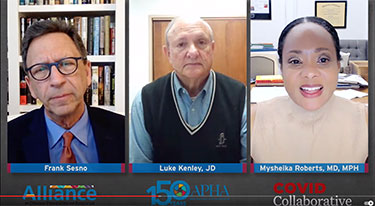Public health workers, who are accustomed to quietly operating in the background to protect communities from health threats, have had to shift strategies during the COVID-19 pandemic, sometimes with mixed success.
In a Tuesday virtual town hall, public health, policy and business leaders from across the U.S. shared their experiences working amid partisan politics, misinformation, threats to their authority and other barriers to keeping communities safe from COVID-19.
While the pandemic is leading to sometimes-hostile environments for health workers, Eduardo Sanchez, MD, chief medical officer for prevention at the American Heart Association, said it is helpful to remember that the public health mission is a force for good, and it has always been challenging. Major public health accomplishments such as motor vehicle safety, tobacco use and occupational health came after lengthy battles, but were worth the commitment.
“That work, in any one of those areas, was really, really hard work,” he said. “We who are interested in the public’s health have learned how to swim upstream against strong currents.”
Speakers during the town hall — which was hosted by APHA, the Alliance for Disease Prevention and Response, and the COVID Collaborative — emphasized the important role public health plays in keeping communities safe and healthy, especially in difficult times.
“The dichotomy between my authority as health commissioner and the necessary collaborations with federal, state and community partners — each with their own political interests and ideas of how to best respond — has played out in unexpected and challenging ways,” said Mysheika Roberts, MD, MPH, health commissioner for Ohio’s Columbus Public Health.
An early example of such a challenge came as Columbus drastically restricted attendance at a March 2020 athletic weightlifting event. The decision was made to prevent the spread of COVID-19, but it came at the cost of millions of tourism dollars. Officials wrestled with the economic cost at a time when cases of COVID-19 had not yet been detected in the state, but decided in the end to trust recommendations from public health officials.
That trust has not held steady throughout the pandemic, however. Over time, the Ohio Legislature has chipped away at the authority of local public health leaders in the state, restricting preventive guidance and requirements for masking, vaccinations and school or business closures.
Ohio is one of many states and communities that have stripped authority from public health agencies and officials during the pandemic, which could have troubling long-term ramifications.
“As written, they will have broader impact, as they will limit the ability of state executive branches or local departments of health from taking action in the future,” said panelist Hemi Tewarson, JD, MPH, executive director of the National Academy for State Health Policy.
In some parts of the U.S., however, the trend has gone the other way, with laws strengthening public health authority formalized and codified, Tewarson said. One common approach has been to establish commissions and advisory bodies to make recommendations regarding public health emergency response to the pandemic.
“We can learn a lot from what we have done during this pandemic — where there have been some successes and where there are a lot of areas that could use some improvement,” she said. “Our public system was not ready to take on what it was presented with.”
Among the potential missteps, according to Michael Leavitt, former governor of Utah and secretary of the U.S. Department of Health and Human Services, was a failure to grasp the reasons behind resistance to public health guidance. The problem for some is not disagreement on science or safety, but the role government plays in daily life, Leavitt said. Listening to the roots of concerns and addressing them directly can help.
“When we confront those (who oppose public health policy), open up to the real issue: ‘What I hear you saying is that you don’t like the government telling you what to do,’” he said.
In Indiana, the state executive branch has lessened resistance from some lawmakers by making their work more transparent. Frequent, regular reports and meetings have kept the process open — and led to more successes, said Luke Kenley, JD, a former state senator who serves on the Governor's Public Health Review Commission. The body was established in August to improve the delivery of public health services in Indiana.
“We think that transparency and sharing our story is the best way to do this,” Kenley said.
To watch a recording of the town hall, visit APHA’s website. For more information about challenges to public health authority and information on how to get involved, contact the Alliance for Disease Prevention and Response.
From left, Frank Sesno, director of strategic initiatives at George Washington University School of Media and Public Affairs, Luke Kenley, JD, and Mysheika Roberts, MD, MPH, take part on Tuesday in APHA's virtual town hall.